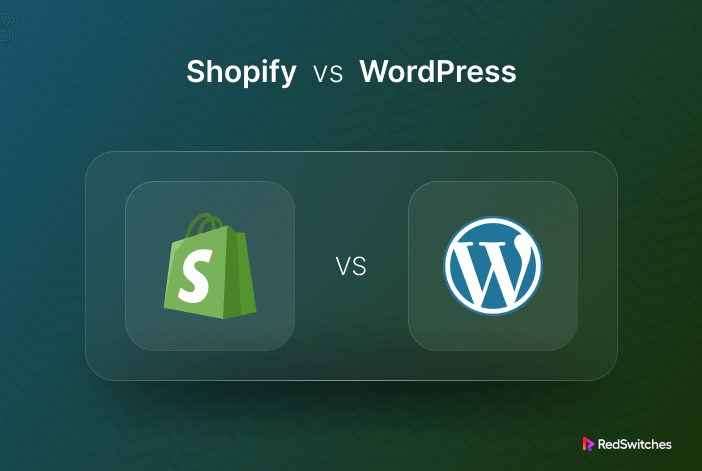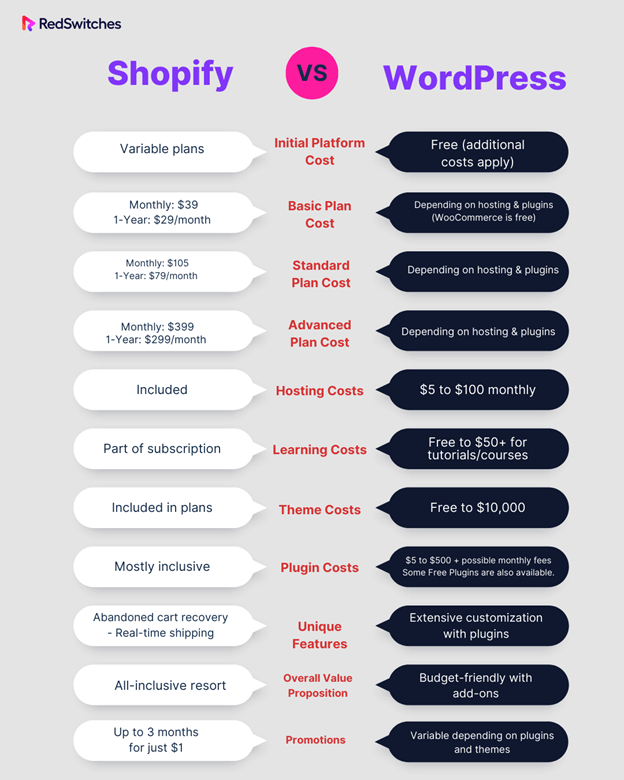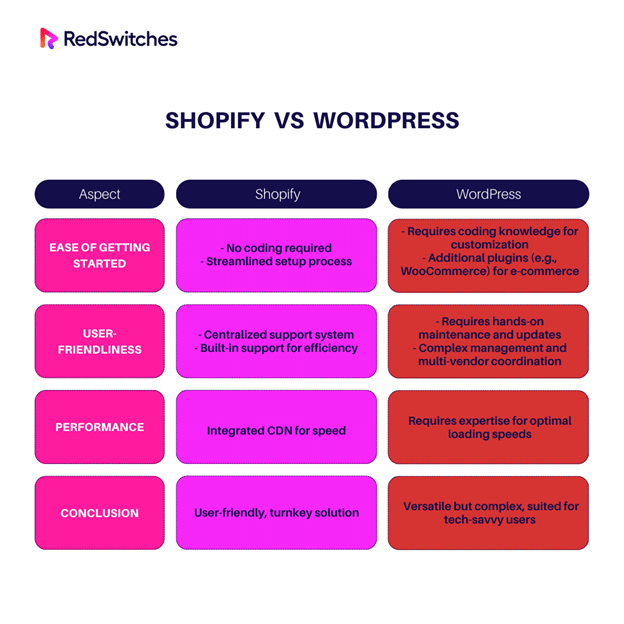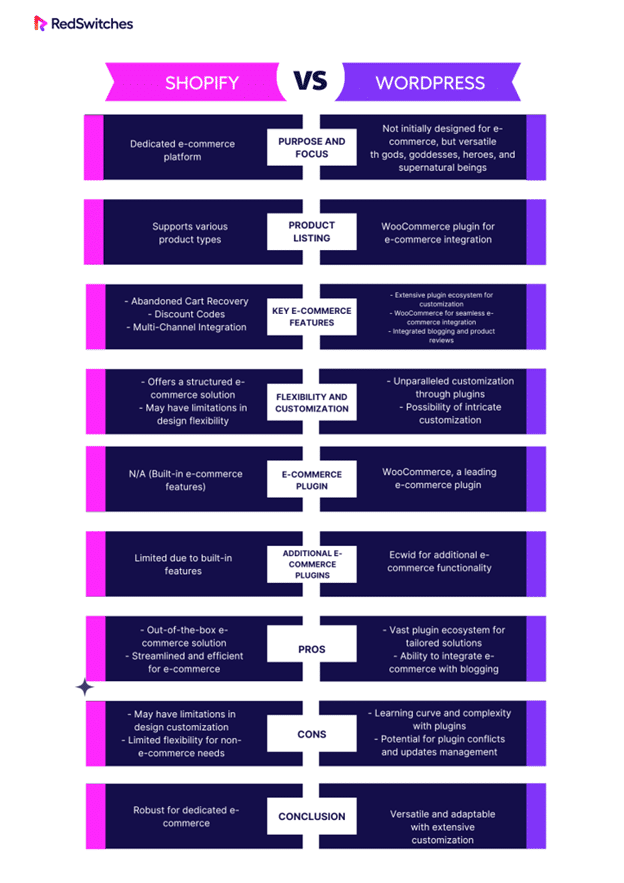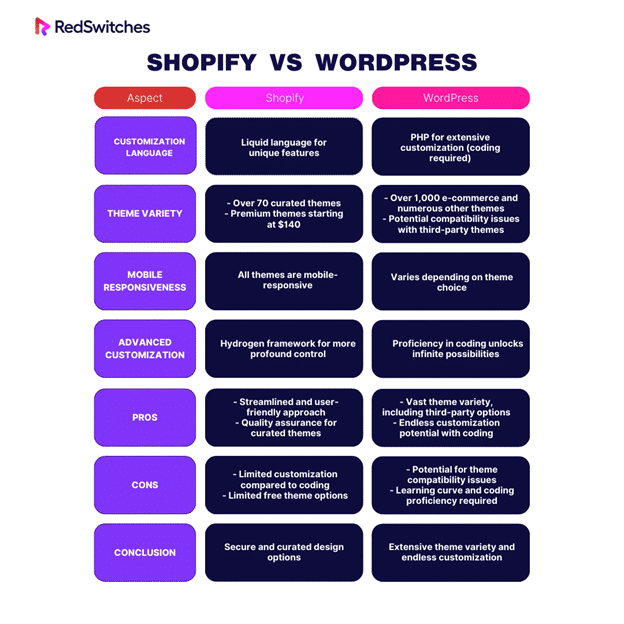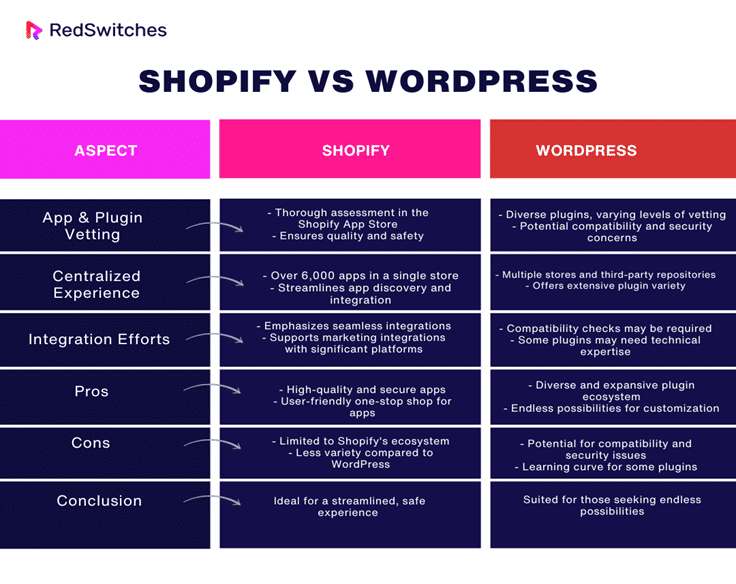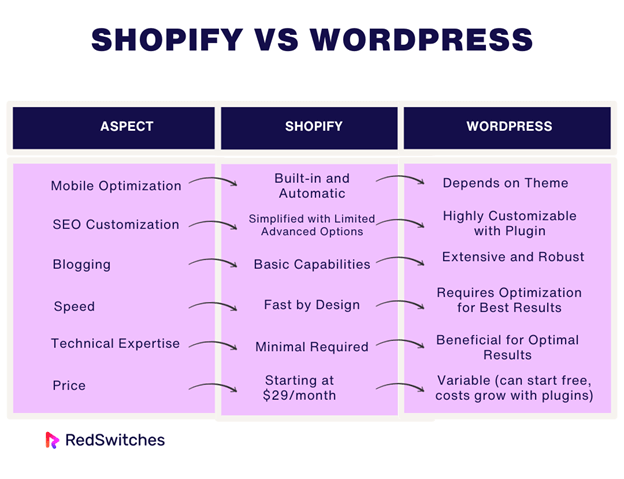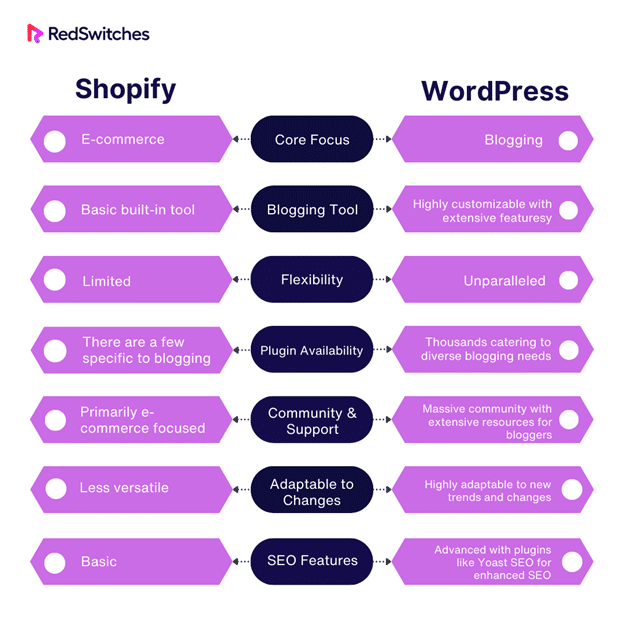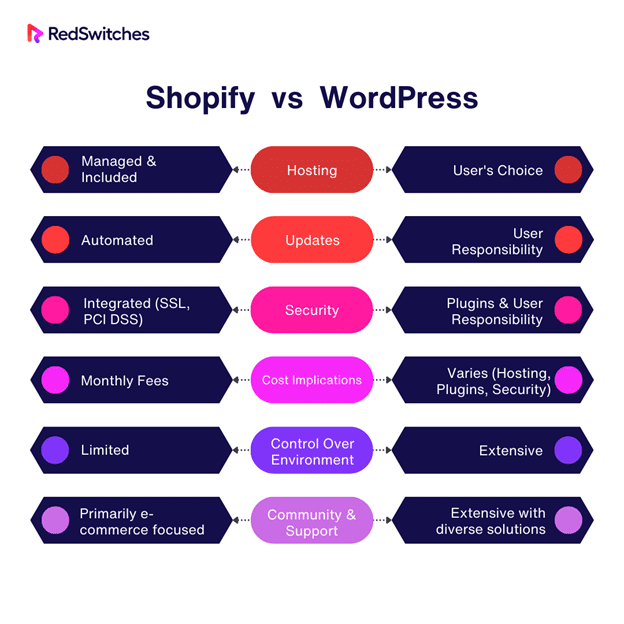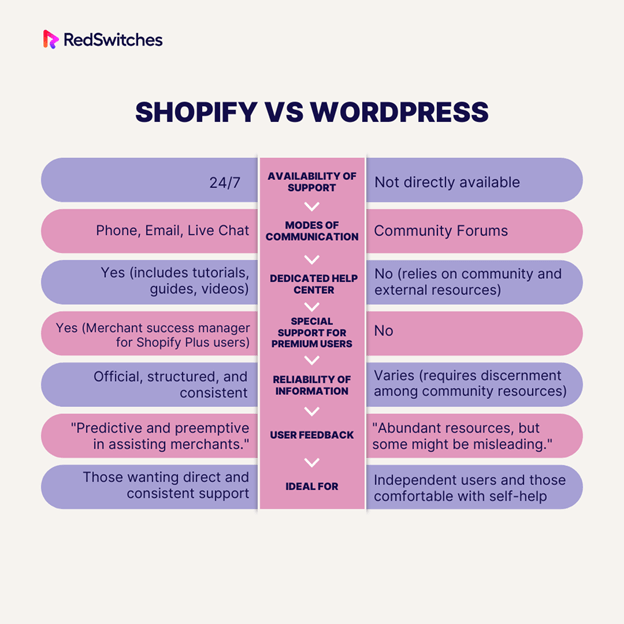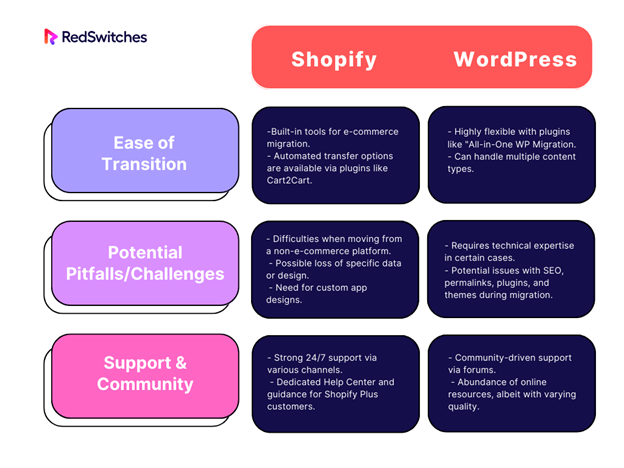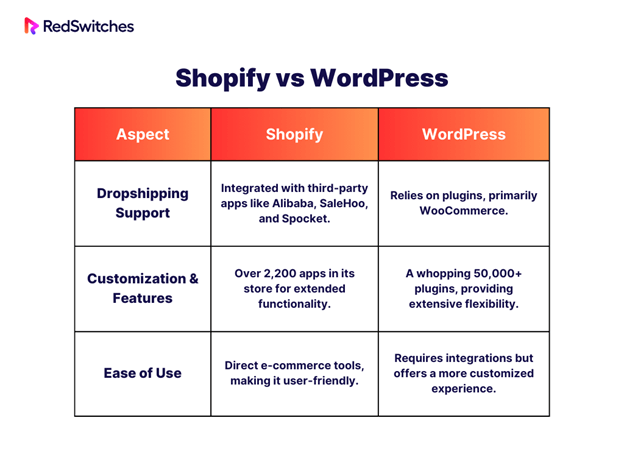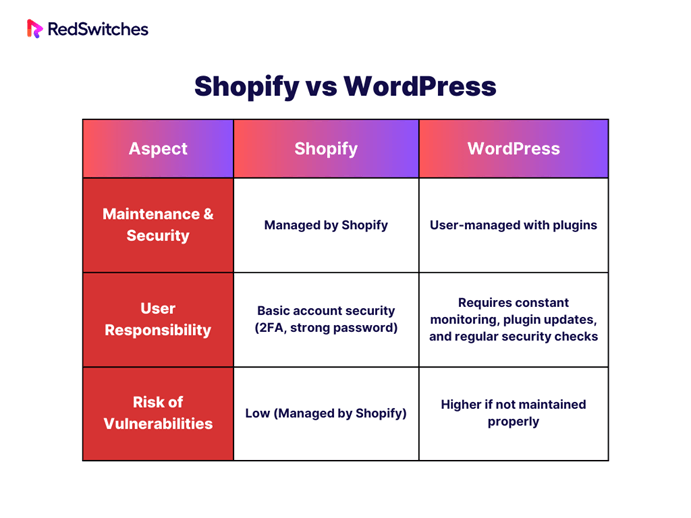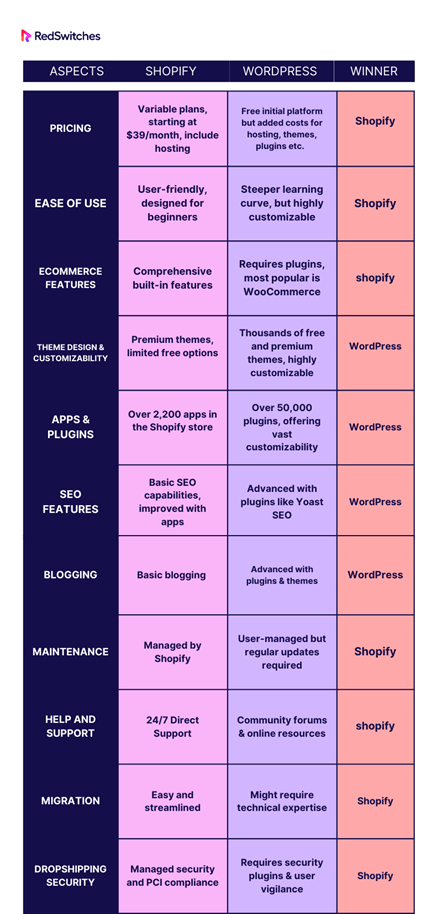In today’s rapidly digitizing world, establishing an online storefront is more than just a trend—it’s essential for businesses seeking to survive in a competitive market. As we venture further into the digital age, platforms like Shopify and WordPress have emerged as leading contenders in the e-commerce arena, offering distinct features and benefits suited to different business needs.
By 2026, the e-commerce market is anticipated to skyrocket to a staggering $8.1 trillion, underscoring businesses’ need to make informed decisions about their online platforms.
This article delves into an in-depth comparison of Shopify vs WordPress, equipping you with the insights to navigate your eCommerce journey confidently and clearly.
Table of Content
- Shopify vs WordPress: An Overview
- Shopify vs WordPress: Deciding factors
- Shopify vs WordPress: Key Differences
- Factor #1: Pricing
- Factor #2: Ease of Use
- Factor #3: eCommerce Features
- Factor #4: Theme Design & Customizability
- Factor #5: Apps & Plugins
- Factor #6: SEO Features
- Factor #7: Blogging Features
- Factor # 8: Maintenance
- Factor # 9: Help & Support
- Factor # 10: Migration
- Factor # 11: Dropshipping Options
- Factor # 12: Security & Reliability
- Shopify vs WordPress: Which Should You Choose?
- FAQs
Shopify vs WordPress: An Overview
The world of e-commerce platforms can feel like an endless maze for newcomers. With countless platforms to choose from, each promising unique feature, where does one begin? Shopify and WordPress are at the forefront of this landscape, two big names that have significantly shaped the e-commerce world. Let’s take a friendly stroll through each of these giants.
What is Shopify?
Credit: Shopify
Shopify is the go-to platform for budding entrepreneurs and small businesses looking to set up a polished online storefront. Beyond just a basic online store, Shopify empowers merchants to extend their reach through social media sites, seller marketplaces, and other blogs and websites.
Fancy selling through chat or email? Shopify has you covered. And the cherry on top? Its in-built point-of-sale (POS) system makes in-person sales a breeze – be it at retail stores, pop-up booths, or local marketplaces.
It’s no wonder that with merchants in over 175 countries, Shopify proudly heralds itself as a global commerce enabler, arming businesses with the tools and building blocks they need to flourish in the digital marketplace.
What is WordPress?
Credit: WordPress
When one thinks of website creation, WordPress often springs to mind. Beginning its journey as a humble blogging platform, WordPress has gracefully transitioned into a powerful content management system that can handle everything from blogs and portfolios to full-fledged eCommerce stores. The numbers speak for themselves, with a whopping 14.7% of the top 100 websites being powered by WordPress.
But it’s not just the bigwigs like Forbes, Samsung, and the New York Times that have jumped on the WordPress bandwagon.
Whether it’s government sites, artists’ portfolios, or educational institutions, WordPress remains a beloved choice for many, offering simplicity and flexibility in website creation.
Shopify vs WordPress: Deciding factors
Selecting the right e-commerce platform between WordPress e-commerce vs Shopify is a foundational step for your online business. Your choice can directly influence your venture’s success, so knowing what to consider is crucial. Here’s a straightforward guide to the primary factors that matter:
Skill Level And Technical Proficiency
- Ease of Use: Platforms should be intuitive and accessible, even if you’re not tech-savvy.
- Customization Depth: While some businesses require basic design changes, others might need a platform that offers deeper customization options.
Design & Flexibility
- Variety of Templates: The platform should offer multiple design templates that cater to different business needs.
- Adaptability: The platform must allow changes to its design and functions, giving businesses room to innovate.
Budget Considerations
- Setup and Ongoing Costs: Evaluate the initial costs of setting up and the subsequent monthly or yearly charges.
- Additional Expenses: Be aware of any extra charges, like transaction fees or costs for essential extensions.
Security Measures
- Robust Security Features: E-commerce sites handle sensitive data, so having strong security features, such as SSL certificates, is a must.
- Regular Maintenance: Some platforms need frequent updates to stay secure and functional. It’s good to be aware of these demands upfront.
Growth Potential
- Scalability: As your business grows, your chosen platform should be able to handle increased traffic without issues.
- Feature Additions: Your business might need new tools or features. Your platform should be flexible enough to integrate these smoothly.
Support & Community Insights
- Reliable Support: A platform’s customer support can make or break your experience, especially during challenging times.
- Active Community: A thriving user community can be a treasure trove of insights, offering advice and shared experiences that can be invaluable for new users.
Your business’s specific needs should always be at the forefront when choosing an e-commerce platform. Understanding these key factors and aligning them with your goals, you’ll be better positioned to pick the best platform between WordPress vs Shopify
for your online store.
Want to start your e-commerce store? Don’t forget to check our WordPress hosting packages.
Also Read: Craft CMS vs WordPress
Shopify vs WordPress: Key Differences
In the vast landscape of e-commerce, Shopify and WordPress emerge as two of the most recognized titans. Each has carved a unique niche, serving countless businesses with distinct offerings. But, as is often the case with giants, understanding the subtle and not-so-subtle differences between them can decide which suits your venture best. Let’s embark on a journey to unravel these differences and help you make an informed decision for your online business.
Factor #1: Pricing
Deciding between Shopify and WordPress often boils down to cost, especially for budding entrepreneurs or small businesses. How much will it cost to set up and maintain your online presence? Let’s dive deep into the pricing structures of both platforms.
Shopify
Shopify offers multiple payment plans to its customers. While the Shopify Basic plan offers the essentials for most small merchants, upgrading to Shopify upgraded plans introduces a detailed reporting tool and the highly-valued abandoned cart recovery.
● Basic Plan
The Shopify platform offers a tiered pricing model for various business needs. The Shopify Basic plan is priced at $39 every month, but if a user commits to a 1-year plan, the monthly cost drops to $29, offering a substantial savings of 25%.
● Standard Plan
The standard Shopify plan has a monthly fee of $105. However, opting for a yearly subscription reduces the price to $79 per month, which translates to a savings of 25%.
● Advanced Plan
For businesses seeking more advanced features, the Shopify Advanced plan is available. This plan comes with a monthly price tag of $399, but with a year-long commitment, this drops to $299 per month, continuing the trend of a 25% savings.
WordPress
The “Free” Misconception
Yes, WordPress is free to use. However, the expenses quickly stack up as you begin building your site:
- Website Hosting Costs: Ranges from $5 to $100 monthly.
- Learning Costs: Several tutorials and courses vary from free to $50+.
- Theme Costs: These range from free templates to premium ones ($35 – $200) and custom designs that might shoot up to $10,000.
- Plugin Costs: Depending on the functionality, these can range from $5 to $500, with some incurring monthly fees. Notably, the WooCommerce plugin for WordPress, which powers e-commerce functionalities, is free. However, other essential plugins might come with hefty price tags.
Ready to optimize your WordPress site? Don’t miss out! Click here for our comprehensive 9-point checklist to ensure you choose the best hosting service.
Final Verdict
Both Shopify and WordPress have their own merits regarding pricing considerations. Shopify offers ease, an all-inclusive package, promotional offers, and potential savings in time and effort. On the other hand, WordPress provides its unique advantages, appealing to a different audience. Ultimately, the best choice depends on individual needs and priorities.
Factor #2: Ease of Use
In today’s digital age, the user-friendliness of an e-commerce platform often dictates its success. Both Shopify vs WordPress have their merits, but there are stark contrasts regarding ease of use. Let’s delve into the key distinctions to provide you with clarity.
Shopify
- No Coding Necessary: The standout advantage of Shopify is its beginner-friendliness. You can get started without coding expertise, making it an inviting option for those new to the e-commerce scene.
- Streamlined Setup: Starting on Shopify is as simple as providing essential business information. The subsequent dashboard acts as a control room from which all aspects of your store can be managed. Helpful prompts make navigation a breeze, ensuring you’re always found.
- Product Management: Uploading and organizing your inventory on Shopify is straightforward. Whether adding items individually or importing a bulk list via CSV, the process is intuitive.
- Built-In Support and Efficiency: Shopify’s emphasis on efficiency is evident. Shopify guarantees optimum site speeds with a unique Content Delivery Network (CDN) and rigorously tested themes. And if you run into any issues, their centralized support system ensures swift resolutions.
WordPress
- Coding Basics: Unlike Shopify, some coding knowledge is beneficial when working with WordPress. This platform offers versatility but demands a steeper learning curve.
- E-commerce Readiness: WordPress needs to be more natively equipped for online sales. To transform it into an e-commerce store, plugins like WooCommerce or Ecwid must be incorporated.
- A Comprehensive Dashboard: While WordPress’s dashboard offers immense tools and options, its vastness can be daunting for newcomers. Navigating this expansive platform requires either a time investment in learning or hiring professional help.
- Customization Challenges: Though WordPress offers unparalleled customization, achieving a certain design or functionality can become intricate—many resort to hiring developers, which can become costly.
- Management and Maintenance: WordPress demands hands-on maintenance as a broader platform. Updates, theme changes, plugin management, and multi-vendor support coordination can be time-consuming.
- Performance Factors: While WordPress’s versatility is its strength, achieving optimal loading speeds, especially compared to Shopify’s standardized themes, demands a higher level of expertise.
Final Verdict
While Shopify stands out for its turnkey solutions, especially for those eager to jump into e-commerce without technical hitches, WordPress shines in its versatility. However, with this flexibility comes added complexities.
Ultimately, the choice between “Shopify vs WordPress” boils down to one’s comfort with the platform’s demands and the vision for the online store.
In the ease-of-use showdown, Shopify emerges as the more user-friendly platform, while WordPress offers depth at the expense of simplicity.
Factor #3: eCommerce Features
In the bustling world of online commerce, ensuring you have the right tools and platform is crucial. Shopify vs WordPress, two giants in online selling, have shown their mettle in empowering businesses. However, when placed side by side, which one trumps the other? Let’s delve deeper to decipher the nuances of both.
Shopify:
- Purpose-built for Online Merchants: From its inception, Shopify was conceptualized to offer a comprehensive solution for online sellers, making the process straightforward and efficient.
- Unhindered Selling Options: Shopify ensures you can list various products regardless of the chosen plan. Whether tangible items or downloadable digital content, the platform accommodates seamlessly.
The top eCommerce features offered by Shopify are as follows:
- Abandoned Cart Recovery: A nudge to shoppers, reminding them of their pending purchases.
- Discount Codes: Empower sales strategies using unique promotional codes.
- Multi-Channel Integration: Harness the power of major social media channels and online marketplaces to diversify your selling points.
WordPress:
- The Strength of Plugins: WordPress isn’t designed for e-commerce by default. However, its dynamism lies in the vast plugin repository, allowing for unparalleled customization and e-commerce strength.
- WooCommerce: The Gold Standard in WordPress E-commerce. An organic extension of WordPress, WooCommerce transforms any site into a potent e-commerce platform.
- Boundless Selling: Introduce myriad products, ensuring your offerings remain diverse and plentiful.
- Integrated Blogging: Fuse your sales strategy with dynamic content marketing.
- Enhanced Shopper Interaction: Features such as product reviews and filtering accentuate the overall user experience.
- Ecwid: Ecwid is a versatile e-commerce solution that allows businesses to integrate online stores with existing websites seamlessly, social media platforms, or marketplaces.
- Swift Guest Checkouts: Streamline the checkout process for visitors.
- Product Bookmarking: Let users earmark their favorite products, encouraging repeated visits.
- Worldwide Accessibility: Ecwid ensures your store resonates with a global audience with precise shipping calculations and language translations.
Final Verdict
The Shopify vs WordPress for e-commerce debate is age-old, and rightly so. Each platform brings distinct advantages to the table. While Shopify offers an out-of-the-box solution tailor-made for e-commerce, WordPress gives you the canvas, brushes, and colors to paint your unique e-commerce store.
With its vast ecosystem and adaptability, WordPress emerges as the more versatile and robust choice for those aiming for e-commerce excellence.
Factor #4: Theme Design & Customizability
The design and customization options can significantly influence the user experience when building an online store or website. Both Shopify and WordPress have established reputations in these domains, but they each have their own approach. Let’s dive deep into the world of themes and customizability these two giants offer.
Shopify:
- The Liquid Advantage: The Liquid language is at the core of Shopify’s customization capabilities. Although less universally recognized than PHP (used by WordPress), Liquid is simpler and can be learned relatively quickly. It’s tailored to allow the creation of unique store features without compromising the platform’s renowned user-friendliness.
- Shopify’s Theme Catalog: With over 70 theme options, Shopify offers a curated selection to ensure quality. Ten of these are free, while the premium ones start at $140—a one-time investment. Notably, Shopify’s themes are mobile-responsive, ensuring your store looks great on all device sizes.
- Advanced Customization with Hydrogen: For those who seek more profound control and customization, Shopify introduces the Hydrogen framework. This tool lets businesses use Shopify as a content backend while allowing extensive design and functionality control on the front end.
WordPress:
- A Sea of Themes: WordPress stands unparalleled regarding theme variety. With over 1,000 e-commerce-focused themes and thousands more for various other niches, the choices are vast. Many third-party developers have also chipped in, further expanding the theme repository.
- Potential Hurdles: The extensive variety, however, comes with challenges. Not all themes are mobile-responsive, and those not officially designed by WordPress may present compatibility issues with updates. This makes it crucial for users to choose themes wisely, preferably sticking to those officially supported by WordPress.
- Coding Mastery Unlocks More: The real power of WordPress is unleashed when one has a proficient grasp of coding. The platform’s open-source nature means that, with the right skills, the design and functional possibilities are nearly infinite.
The Final Verdict
Both Shopify and WordPress bring strong offerings in theme design and customizability. Shopify’s approach leans toward a curated, secure, and streamlined experience, while WordPress champions diversity and endless customization potential.
Ultimately, it’s a tie. The choice boils down to individual needs: Shopify might be the better pick if you’re looking for a more straightforward, e-commerce-centered solution. But for those who relish limitless design possibilities and have a knack for coding, WordPress remains the king.
Unlock the secret to superior server hosting! Dive into our ultimate guide now and make informed decisions with confidence.
Factor #5: Apps & Plugins
In today’s digital landscape, the adaptability and extensibility of an e-commerce platform play pivotal roles. The array of apps and plugins available often determines this. The two giants, Shopify and WordPress, have distinct approaches to this. Let’s break it down to understand better.
Shopify:
- Rigorous Vetting: Unlike many platforms, Shopify ensures that every app passing through its doors undergoes a thorough assessment. This vetting process in the Shopify App Store is tailored to meet high quality and safety standards.
- Assurance of Safety: For merchants, this translates to a reliable ecosystem where apps are efficient and secure, limiting potential vulnerabilities.
- One-stop App Store: Instead of scattering resources, Shopify focuses on providing over 6,000 top-notch apps, all housed within a single store. This centralization aids merchants in discovering and integrating apps effortlessly.
- Seamless Integrations: Apps like DSers for AliExpress supplier connections or Scala Parcelamento for installment pricing are prime examples of Shopify’s commitment to smooth user experience.
- Diverse Marketing Integrations: By facilitating connections with platforms like Facebook Ads and Google Analytics, Shopify ensures businesses have the tools to widen their reach and better understand their audience.
WordPress:
- Open Ecosystem: WordPress’s charm lies in its welcoming nature. The platform, especially with WooCommerce, encourages countless developers to contribute, creating a vast library of plugins.
- Multiple Repositories: While WordPress and WooCommerce have dedicated stores, the platform’s openness means several third-party repositories give users an unmatched variety.
- The Quest for Compatibility: Though enticing, the vast sea of options requires users to ensure that the plugins they choose are compatible with their version of WordPress and other plugins.
- Slightly Steeper Learning Curve: For those new to the WordPress ecosystem, integrating some plugins might not be as straightforward as Shopify. Some may require technical know-how or additional extensions to function perfectly.
Final Verdict:
Pitting Shopify vs WordPress for e-commerce in the context of apps and plugins is challenging, as both have unique strengths. For businesses prioritizing a streamlined, safe, and easy-to-navigate experience, Shopify is a clear winner. However, if we were to analyze from a Shopify blog vs WordPress perspective, WordPress’s robust blogging capabilities give it an edge.
Conversely, WordPress shines for those who prefer a platform that offers boundless possibilities, even if it means navigating a more complex ecosystem.
Factor #6: SEO Features
The battle between Shopify vs WordPress in the domain of SEO holds significant importance for businesses. Both platforms offer unique features and capabilities that can help get organic traffic to your site. Let’s delve into a detailed comparison of their SEO strengths and weaknesses.
Shopify:
● Built-in Mobile Optimization
- Shopify shines in mobile optimization. Google, the leading search engine, places a significant emphasis on mobile-friendly websites due to the rapidly growing number of users accessing websites via smartphones and tablets.
- Advantage: Shopify stores are instantly mobile-friendly with their mobile theme architecture. This enhances user experience and positions the site favorably in search engine rankings.
● SEO-Friendly Design
- Shopify, right from the start, is tailored to be SEO-friendly. This feature allows even those with minimal knowledge of SEO to benefit.
- Highlight: The platform auto-generates XML sitemaps, which is crucial for search engine indexing. Additionally, users have the flexibility to customize meta tags and title descriptions to align with their SEO strategy.
● User-Friendly Interface
- Shopify boasts of an interface that’s intuitive and user-centric. Users without technical expertise can navigate and make the most of the available SEO settings.
- Perk: Beyond the basics, Shopify’s ecosystem is enriched with SEO apps that cater to specific needs such as keyword research, on-page optimization, and backlink building.
● Reliable Hosting & Swift Page Load Speeds
- Shopify’s fully hosted solution ensures consistent uptime, security, and prompt updates. This aids in maintaining positive SEO rankings.
- Bonus: Shopify is renowned for its fast loading times, which search engines value. Aided by tools like image compression, content delivery networks (CDNs), and more, Shopify enhances user experience and SEO results.
Cons of Shopify SEO
Despite its strengths, Shopify has areas that could be potential pitfalls for some businesses:
- Limited Technical Customization: While Shopify simplifies many SEO aspects, it doesn’t offer granular control over advanced SEO techniques like URL customizations or server configurations.
- URL Constraints: Shopify has restricted URL customization. This limitation can sometimes lead to URLs that aren’t as SEO-friendly as one might desire.
- Blogging Limitations: Shopify does house a blogging platform, but WordPress is more comprehensive. Thus, content marketing efforts face some constraints.
- Pricing: Shopify’s ease of use might come at a cost that some businesses find steep, especially when starting.
WordPress:
● SEO-focused Codebase
- WordPress stands out due to its flexible and SEO-friendly codebase.
- Merits: The platform’s clean code is a dream for search engines to crawl and index. Moreover, advanced SEO strategies like schema markup can be easily integrated, enhancing content clarity for search engines.
● Robust Blogging Capabilities
- Initially a blogging platform, WordPress has an edge in content creation.
- Strength: It provides comprehensive blogging tools and plugins that can optimize posts for search engines, ensuring that content engages readers and appeals to search algorithms.
● Diverse Theme Choices
- With WordPress, the possibilities are vast when it comes to design.
- Advantage: Numerous mobile-responsive themes are tailored for WordPress, ensuring businesses have an attractive, SEO-friendly design.
● Extensive SEO Plugins
- WordPress’s open-source nature means many SEO plugins are available.
- Highlight: Plugins like Yoast SEO offer in-depth optimization capabilities, from meta descriptions to sitemaps, bolstering the site’s SEO performance.
Cons of WordPress SEO
- Requires Expertise: While plugins simplify SEO, achieving optimal results might require expert insights, especially for keyword research or technical SEO.
- Support Challenges: Being open-source, WordPress doesn’t offer centralized customer support. Solutions often need to be sourced from forums or third-party experts.
- Speed Concerns: Inherent platform speed might not match Shopify’s, and optimal speeds on WordPress often require additional plugins or optimization strategies.
Final Verdict
Upon closely analyzing the SEO features and capabilities of Shopify vs WordPress, the edge goes to WordPress regarding overall flexibility, customization, and its vast ecosystem. While Shopify offers a robust, ready-to-use solution ideal for e-commerce businesses, WordPress stands out with its deeper customization options, extensive blogging capabilities, and unmatched SEO plugins.
Factor #7: Blogging Features
The decision between Shopify vs WordPress for blogging depends mainly on a business or individual’s specific needs and goals. Let’s delve deep into the blogging capabilities of both platforms to understand their strengths and weaknesses.
Shopify:
Built-in Blogging Tool
- Shopify offers an inherent blogging tool, a handy feature for e-commerce businesses wanting to integrate blog posts into their online store without switching platforms.
- It provides basic features like categories and tags that help organize content for a better user experience.
Limitations
- Lack of Plugins: Unlike WordPress, Shopify’s blogging platform needs more plugins to enhance functionality.
- Limited Flexibility: While suitable for beginners, Shopify’s blogging capabilities may need to be improved for more complex or growing needs.
- Adapting to Change: The Shopify blogging platform has limitations regarding versatility. Rapid changes or adaptability to new SEO trends might be restricted due to the platform’s core e-commerce focus.
WordPress:
Unparalleled Flexibility
- As one of the most ideal content management systems globally, WordPress offers an extensive range of free and paid themes tailored for blogging.
- With the ability to add plugins for enhanced SEO, analytics, social sharing, and more, WordPress offers a scalable solution for bloggers.
Versatility & Adaption
- With WordPress, adapting to changes or new trends becomes a breeze. WordPress allows quick integration and customization, whether structured data, new SEO algorithms, or other tech innovations.
- WordPress, combined with the right plugins, allows for the implementation of structured data, enhancing the chances of blogs getting rich snippets in search results.
A Vast Ecosystem
- More than 60 million users trust WordPress for blogging, a testament to its power and flexibility. With a massive community, you’ll find resources, tutorials, and solutions for nearly any challenge or requirement.
Final Verdict:
When it comes to blogging, WordPress undeniably reigns supreme. Shopify, primarily an e-commerce platform, offers basic blogging tools that may cater to beginners or those who wish to integrate simple blogs into their online stores.
However, WordPress offers unmatched functionality for those looking for a versatile, scalable, and customizable blogging experience.
The vast array of plugins, themes, and an extensive community means bloggers have all the resources they need at their fingertips. WordPress is not just a platform; it’s an entire ecosystem that supports the evolving needs of modern bloggers. For individuals or businesses serious about blogging, WordPress is the clear winner.
But don’t just commit to a hosting plan without being prepared! Uncover the top 10 tips you need to know before making a choice.
Factor # 8: Maintenance
Maintenance is crucial When running an online platform, whether a blog, e-commerce store, or business website. The ease of maintenance can significantly influence a user’s overall experience and the efficiency of managing the platform. Here, we’ll dive into the maintenance intricacies of two major platforms: Shopify vs WordPress.
Shopify:
Hassle-free Hosting
- Automated Updates: With Shopify, users don’t have to worry about updates. The platform handles all software updates, ensuring that stores always run the latest and most secure version.
- Integrated Solutions: Hosting is included in Shopify’s package, eliminating the need to manage or seek third-party hosting services.
Security Assurances
- SSL Certificates: All Shopify stores have a 256-bit SSL certificate at no additional cost, ensuring data safety.
- Compliance: Shopify is Level 1 PCI DSS compliant, ensuring that transactions and customer data are handled with the utmost security.
Limitations
- Less Control: While the managed solution offers ease, it also means less control over certain backend aspects, which might concern some advanced users.
- Cost Implications: Monthly fees are standard with Shopify. While this includes hosting and security, it can be pricier over the long haul.
WordPress:
Hosting Freedom
- Diverse Choices: WordPress users can choose from many hosting providers, ranging from budget-friendly to premium solutions.
- Control Over Environment: This freedom means greater control over the server environment, allowing for specific customizations.
Maintenance Responsibilities
- Regular Updates: WordPress, an open-source platform, requires regular updates for its core software, themes, and plugins. While this ensures the site stays up-to-date, it’s the site owner’s responsibility.
- Security: While there are robust plugins like Wordfence or Sucuri Security for WordPress, the responsibility for security largely rests on the user. This includes regular backups, malware scans, and ensuring SSL certification.
Extensive Community & Resources
- Vast Ecosystem: A considerable advantage of WordPress is its extensive community. If users face issues, chances are someone else has faced and solved the same problem.
- Plugins for Maintenance: WordPress offers various plugins that can assist website maintenance, from automated backups to performance optimization.
Final Verdict:
Considering the balance between ease of maintenance and control, Shopify emerges as the winner for those wanting a simplified, worry-free experience without delving into the nitty-gritty of regular site upkeep. It’s the ideal choice for individuals or businesses seeking a hosted solution where technical challenges, hosting, and security are efficiently handled in the background.
Factor # 9: Help & Support
When establishing an online presence, assistance and support from platform providers can make all the difference. From setting up your store or site to troubleshooting technical glitches, having reliable help is invaluable. Let’s delve into the help and support offerings of Shopify and WordPress.
Shopify
Shopify’s commitment to its users is evident in its many support channels. Some of its commendable features include:
- 24/7 Assistance: Whether through phone, email, or live chat, Shopify ensures that users can reach out anytime, anywhere.
- Help Center: A comprehensive onsite Help Center, replete with tutorials, guides, and videos, facilitates users in resolving common queries and challenges.
- Dedicated Manager for Premium Users: Shopify Plus users receive additional support through a personal merchant success manager. This individual provides consistent guidance, ensuring optimal website performance and growth.
WordPress
Unlike Shopify’s direct support approach, WordPress relies on its expansive community for aid:
- Forums: WordPress boasts a forum teeming with technical information. It acts as a collaborative space where users can pose questions and experts from the community provide solutions.
- Reliance on External Resources: Given WordPress’s vast user base, many unofficial blogs, guides, and YouTube channels have emerged. While this offers abundant information, it also challenges discerning accurate and reliable sources from misleading ones.
A crucial point to remember is that WordPress, a free platform, doesn’t promise or charge for premium service. It anticipates that its technically inclined audience will predominantly rely on self-help and community forums.
Final Verdict
Choosing between Shopify vs WordPress based on support can be likened to choosing between a dedicated customer service team and a vast, knowledgeable community.
Shopify clearly stands out for those who prefer readily available, structured, and official support. Its multiple avenues for direct assistance and the proactive approach make it ideal for users who value such handholding.
Factor # 10: Migration
In the ever-evolving digital realm, the need for website migration can arise for various reasons, be it a shift in business focus, a platform’s limitations, or the allure of new functionalities. Both Shopify and WordPress, while serving different core purposes, offer pathways for migration. But how do they compare ease, flexibility, and potential challenges? Let’s delve deeper into the migration journey on both platforms.
Shopify:
Ease of Transition:
- Shopify, primarily built for e-commerce, provides tools and services that ease migration, especially if you’re transitioning from another e-commerce platform.
- The Shopify App Store houses several migration tools and plugins like “Cart2Cart” that help automate transferring products, customers, and order data.
Potential Pitfalls:
- However, migrating to Shopify from a non-e-commerce platform might pose some challenges, including the potential loss of specific data or design elements.
- For custom-built features on your old site, you might need to find or design new Shopify apps.
WordPress:
Flexibility in Transition:
- With its open-source nature, WordPress offers extensive flexibility for migrations. Tools like “All-in-One WP Migration” make migrating a website into or out of WordPress relatively straightforward.
- It can handle various content types, including blogs, portfolios, and e-commerce, making the transition versatile.
Challenges Faced:
- While the process can be straightforward, it often requires technical know-how, especially if you’re trying to preserve SEO rankings, permalinks, or specialized content types.
- Plugins and themes might only sometimes transition seamlessly, necessitating replacements or adjustments.
Final Verdict:
Shopify might be the better choice for businesses focused purely on e-commerce and looking for a less technical migration process. However, if versatility, control over data, and adaptability for various content types are a priority, then WordPress offers a broader landscape despite its steeper learning curve.
Factor # 11: Dropshipping Options
In the world of e-commerce, dropshipping remains a popular model due to its low upfront investment and inventory-free approach. But the question stands – Shopify vs WordPress, which is more suitable for this business model? Let’s delve deeper.
Shopify
- Abundant eCommerce Features: Being a dedicated platform for e-commerce, Shopify is equipped with numerous built-in tools tailored for online selling.
- Abandoned Cart Recovery: An intelligent feature that nudges customers through email reminders about unfinished purchases, potentially boosting sales.
- Automatic Shipping Calculations: Shopify can auto-calculate shipping costs based on customer location and product details, reducing manual work.
- Shopify POS: Accept payments worldwide with their pocket-friendly $58 card.
- Dropshipping Integration: Shopify seamlessly syncs with several third-party apps (like Alibaba, SaleHoo, and Spocket), facilitating hassle-free dropshipping.
- Buyer Profiles: Tracking buyer behavior aids in targeted marketing, turning potential leads into loyal customers.
- Promotions: Incorporate discount codes and gift cards using specific apps to enhance customer loyalty.
- Multichannel Selling: Broaden your reach by selling across various platforms, including Amazon and eBay.
- Expansive App Store: With over 2,200 apps, Shopify ensures you have the tools to customize and enhance your store.
- Analytics: A dedicated reporting feature further enhanced when integrated with Google Analytics.
WordPress
- Integration-centric Approach: WordPress doesn’t inherently support e-commerce. However, by integrating plugins like WooCommerce, it becomes a formidable contender in the online selling arena.
- Seamless Integration: WooCommerce is the recommended choice for WordPress. It integrates smoothly and offers features like product sorting, automated tax calculations, and multi-channel selling.
- Diverse Plugins: With over 50,000 plugins and integrations available, WordPress overshadows Shopify’s 2,200 offerings.
Final Verdict
While Shopify offers a straightforward, feature-rich platform tailor-made for e-commerce, WordPress, in alliance with plugins like WooCommerce, presents unparalleled flexibility.
Factor # 12: Security & Reliability
In online businesses, security is paramount, especially for e-commerce websites. Shopify and WordPress offer online business platforms, but their security approaches differ significantly. Let’s compare and contrast these platforms in terms of dropshipping security.
Shopify
Integrated Maintenance and Security:
- Hosted Solution: Since Shopify is a hosted platform, it handles most of the maintenance and security. Users need to ensure the security of their accounts.
- User Responsibility: Shopify users need to take care of basic security measures like two-factor authentication (2FA) and maintaining strong passwords.
- PCI-Compliance: Shopify takes the bonus of ensuring PCI-compliance, especially concerning transactions, and ensures that the site doesn’t harbor security vulnerabilities.
WordPress
Self-Maintained Security:
- Self-Hosted Nature: WordPress, a self-hosted platform, puts the users’ responsibility for maintenance and security squarely.
- Security Plugins: Users must rely on various plugins to keep their WordPress site safe.
- Regular Monitoring: Continuous vigilance is required to ensure that the WordPress site remains free of vulnerabilities.
- Vulnerabilities: WordPress sites can become susceptible to hacking if improperly maintained.
Final Verdict:
The distinction between Shopify vs WordPress is clear regarding dropshipping security. Being a hosted solution, Shopify relieves users of the bulk of security and maintenance worries, while WordPress demands more attention and effort to ensure security.
Shopify vs WordPress: Which Should You Choose?
The debate between Shopify vs WordPress is ever-evolving, with each platform’s unique strengths. Throughout the article, we delved into different aspects of both platforms, examining their features, security, support, and more. Let’s summarize our findings and conclude which platform is the top contender.
Considering the entirety of our evaluation, in the debate of “Shopify vs WordPress”, Shopify stands out as the more versatile and user-friendly platform, making it the ideal choice for most online entrepreneurs.
No matter your choice of platform, hosting is the pulse that keeps your online venture alive and responsive! Dive into the digital excellence offered by Red Switches, a renowned hosting maestro, harmonizing flawlessly with any platform you pick, guaranteeing your online store performs at its peak with unbeatable uptime.
RedSwitches also offer the best dedicated server pricing and deliver instant dedicated servers, usually on the same day the order gets approved. Whether you need a dedicated server, a traffic-friendly 10Gbps dedicated server, or a powerful bare metal server, we are your trusted hosting partner.
FAQs
Q-1) What’s more expensive, Shopify or WordPress?
WordPress may be the more economical option when scrutinizing the overall expenses, especially for those proficient in managing plugins, security, and hosting.
Q-2) Should I switch from WordPress to Shopify?
If your primary objective is a streamlined e-commerce experience with less hands-on management of plugins and security, switching to Shopify would be beneficial
Q-3) What is the difference between Shopify and WordPress?
Shopify and WordPress are both platforms used for creating online stores, but they have different functionality and features. Shopify is an ecommerce platform that is specifically designed for building online stores, while WordPress is a content management system that can be used for various types of websites, including ecommerce websites.
Q-4) Can I use WordPress to create an online store?
Yes, you can use WordPress to create an online store. There are various ecommerce plugins available for WordPress, such as WooCommerce, which can add ecommerce functionality to your WordPress website.
Q-5) Why would I choose Shopify over WordPress for my online store?
Shopify is a dedicated ecommerce platform that offers a wide range of built-in features and tools specifically designed for online stores. It provides an all-in-one solution for managing your online store, including hosting, security, payment processing, and more. So if you are looking for a hassle-free and comprehensive solution for your online store, Shopify might be the better choice for you.
Q-6) Can I use Shopify and WordPress together?
Yes, it is possible to use Shopify and WordPress together. You can use Shopify to power the ecommerce functionality of your website, while using WordPress for content management and other non-ecommerce-related features.
Q-7) What are the differences between Shopify and WordPress in terms of pricing?
Shopify offers various pricing plans starting from as low as $29 per month, while WordPress itself is free to use. However, keep in mind that you might need to pay for additional plugins, themes, and hosting if you choose to use WordPress for your online store.
Q-8) Do I need any coding knowledge to use Shopify or WordPress?
No, you do not need any coding knowledge to use Shopify or WordPress. Both platforms provide user-friendly interfaces and drag-and-drop functionality, making it easy for anyone to create and manage their online store or website.
Q-9) Which platform is better for SEO, Shopify or WordPress?
Both Shopify and WordPress offer SEO-friendly features and tools. However, some people argue that WordPress has more flexibility in terms of customizing SEO elements, such as meta tags and URLs. Ultimately, the success of your SEO efforts depends on various factors, including the quality of your content and the optimization techniques you use.
Q-10) Can I use the same theme on both Shopify and WordPress?
No, you cannot use the same theme on both Shopify and WordPress. Shopify has its own theme store where you can choose from a wide range of professionally designed themes, while WordPress has its own theme marketplace where you can find themes specifically designed for WordPress websites.
Q-11) Does Shopify have a mobile app?
Yes, Shopify has a mobile app that allows you to manage your online store on the go. The app provides features such as order management, inventory management, and analytics, giving you the flexibility to run your business from anywhere.
Q-12) What is the difference between Shopify and Shopify Plus?
Shopify Plus is an enterprise-level plan offered by Shopify. It provides additional features and capabilities, such as advanced analytics, dedicated support, and custom checkout options. Shopify Plus is designed for high-volume businesses and offers scalability and flexibility to meet the unique needs of larger online stores.
Q-13) Which is cheaper, WordPress or Shopify?
WordPress may appear cheaper initially, but when considering all the added costs and potential complications of plugins, Shopify often provides better value for money, especially for those prioritizing e-commerce.
